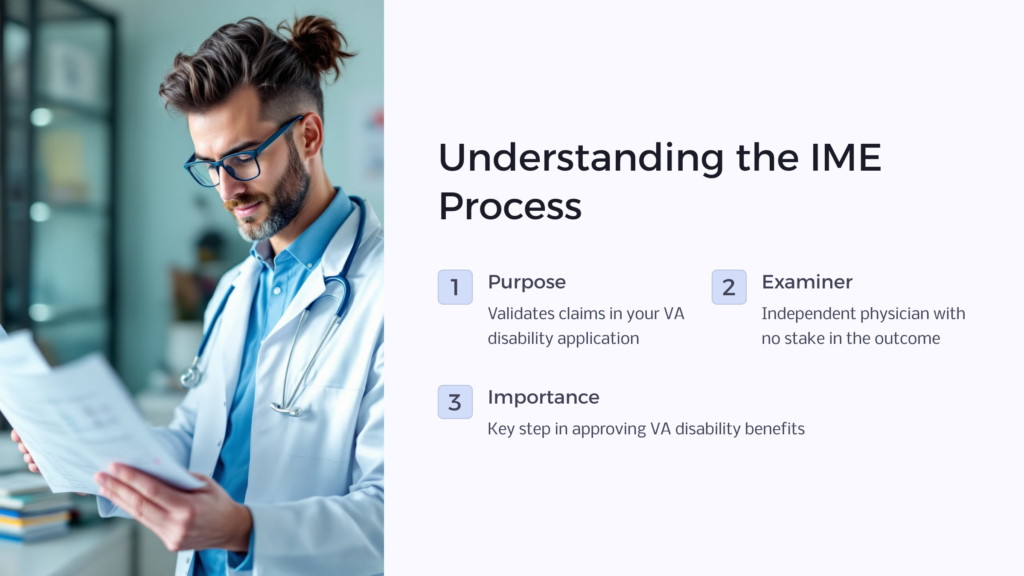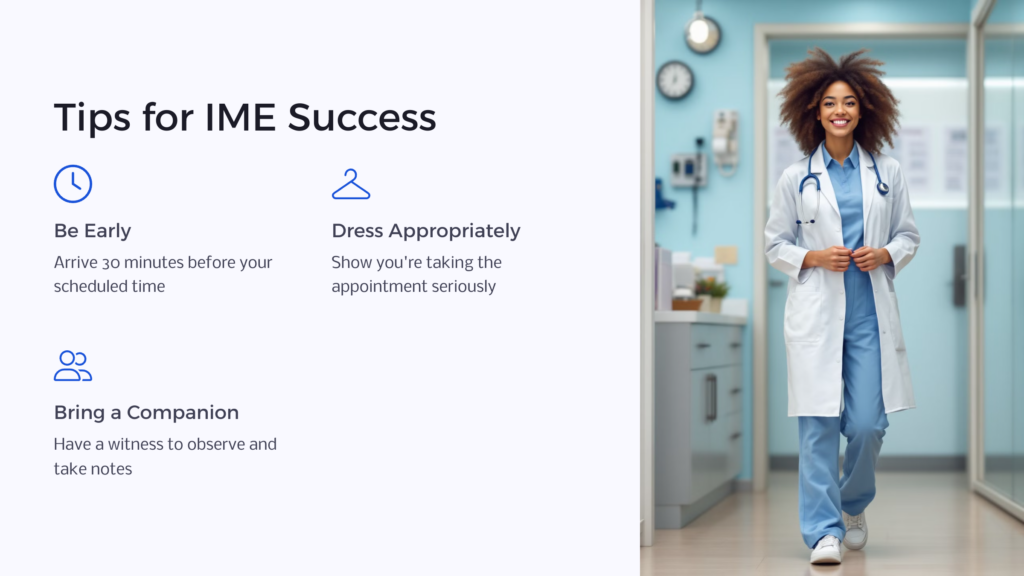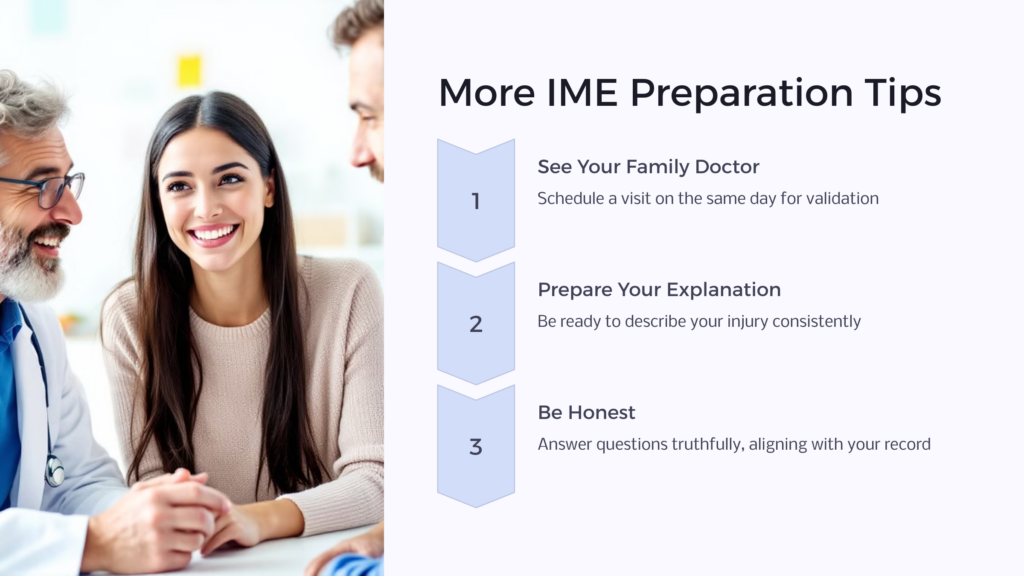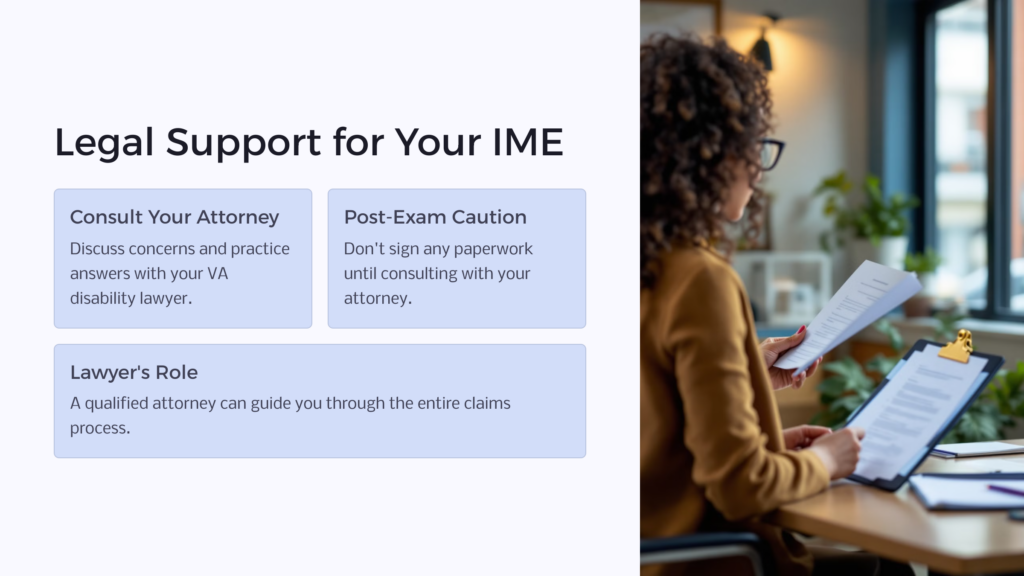If you’ve applied for disability benefits through the U.S. Department of Veterans Affairs, chances are you may be asked to sit for an Independent Medical Examination – or your lawyer may recommend that you do so in order to strengthen your claim. This is a simple process that allows an independent, third-party medical professional to evaluate your medical history and your current physical condition to help validate the claims made within your application.

Theoretically, this physician has no interest in you or the VA and no stake in whether your claim is approved, which allows her to submit an unbiased opinion on your case. This is an important step in being approved for your VA disability benefits, so making sure you’re prepared in advance can help set you up for success.
8 Tips to Prepare for your IME
- Be on Time – Which Means Early
- Dress Appropriately
- Bring Someone With You
- See Your Family Doctor on the Same Day
- Be Ready to Explain Your Injury
- Always Be Honest
- Be Brief but Thorough in Your Answers
- Talk to Your Attorney Before Your Visit
IMEs often are key to a VA disability benefits claim being approved. IME visits can often feel intimidating, since to a great extent the validity of your VA disability claim is being tested. An IME will be conducted by a physician who has never seen you before and who, at least theoretically, has no vested interest in whether your claim is approved or denied.
The professional opinion of your IME examiner will go a long way toward supporting or hindering the approval of your claim. If you take the right steps to prepare, your IME visit can go smoothly and help support your disability claim. If you’re working with a qualified and trusted VA disability lawyer, your attorney can be invaluable during the preparation process and can help you feel confident in how you’ll answer questions from the IME examiner.
In the meantime, you can also use the steps we’ve outlined here as a good guide for preparation. There are several steps you can take to prepare for your IME that can help it go smoothly and successfully.

1. Be on Time – Which Means Early
It’s not enough to arrive exactly on time for your IME appointment – you want to make sure to get there at least 30 minutes before your scheduled time. This allows you plenty of opportunity to complete any necessary paperwork before you actually see the medical professional. Doing this will help make sure not only that you see the IME physician on time, but that you also keep him on schedule for appointments following yours. Showing up right on time or a little late will likely extend the length of your visit and get you off to a wrong start with your IME physician.
2. Dress Appropriately
This is a big deal and an appointment that can greatly affect the success of your claim, so make sure to show that you’re taking it seriously and that it’s important to you. Especially make sure that you aren’t dressed in such a way that contradicts anything in your veterans disability claim. For example, don’t show up dressed for jogging if your claim includes mobility issues.
3. Bring Someone With You
You have the right to bring someone else with you to your IME visit – whether that be a family member, your attorney, a friend, or colleague. It’s a good idea to have a witness with you who can verify what was said during the discussion and who can take detailed notes on your behalf. They may prove useful later in the process. Don’t be afraid to be assertive about this – make sure you do not go into the examination room alone. Just make sure your companion knows he can’t answer any questions on your behalf; his job is simply to observe and document the interaction with the IME physician.

4. See Your Family Doctor on the Same Day
Having a second recorded medical visit on the same day can help provide validation of your physical or mental condition at that point in time. If at any time in the process you have concerns about the accuracy of the IME report, it is nice to have an alternative opinion on file from a medical professional, especially one intimately familiar with the details of your case.
5. Be Ready to Explain Your Injury
You will likely be asked to explain to the IME physician how your physical injury or health condition came about. This isn’t the time to embellish or dramatize your story – it should match exactly what’s in your claim, including what’s documented from previous medical examinations. Any inconsistency at this point can greatly damage your credibility.
6. Always Be Honest
Keep in mind that the medical examiner already has your file – you should make sure you’re familiar with everything that’s included and make sure to answer all questions honestly and in alignment with what your record shows. Don’t try to conceal previous injuries or exaggerate current injuries – either one will only serve to hurt your claim and potentially prolong the process.
During the exam, you likely will be asked to rate your pain level – do so honestly, but with as much objectivity as possible. For example, it’s highly unlikely that your pain will be at a level 10 during your exam, which indicates excruciating agony. Exaggerating your pain level and anything else related to your condition may lead the examiner to view you as less than credible and plant the seed of doubt about your claim.
If you’re asked to complete a physical task during your visit, do so to the best of your ability, without exaggerating your injury or health condition. If something hurts, say so, and if you can’t complete a physical task, don’t push yourself to do so.
7. Be Brief but Thorough in Your Answers
Try to keep answers to any questions focused on the most important information that supports your claim, and only elaborate further if you’re asked to. You may want to practice your answers in advance so that you feel confident getting right to the point and sticking to the facts. It’s easy to start to ramble when you’re nervous and you haven’t practiced ahead of time, which can mean you end up giving the IME doctor a lot of information that isn’t necessarily useful or supportive of your application. If you’re working with a qualified veterans disability attorney, your lawyer can help you refine your answers so that they’re as clear and helpful as possible.
8. Consult With Your Attorney Before Your Visit
It’s typically in your best interest to work with a qualified VA disability lawyer, who can help you navigate the entire claims process, including preparing for your IME visit. Make sure to talk through any concerns you have and use your disability attorney as a resource to help you practice your answers so that you provide the most important information, clearly and succinctly. When your IME visit is concluded, you are not obligated to sign any paperwork agreeing to anything. In fact, you shouldn’t do so until you’ve had the chance to visit with your lawyer.
What’s the Difference between a C&P and IME?
While both Compensation and Pension exams and IMEs may be part of your VA disability benefits application process, they’re carried out by different types of medical professionals for different reasons. First, the VA employs a team of medical professionals who will perform a Compensation and Pension exam for anyone who files a VA disability claim.
These exams are carried out within very specific and very strict guidelines to make sure that the VA is getting an accurate assessment of the disability or health condition in question. They are carried out by physicians hired or retained by the VA for this purpose – so they can’t be considered independent medical experts. Always remember that these medical professionals work for the VA, so they may be influenced in the VA’s favor. C&P examiners aren’t always licensed doctors. They just must be a qualified medical expert, so that may include nurse practitioners and physician assistants, among other clinical experts.
In contrast, an IME physician is an independent, third-party medical expert who has never seen you before and has no stake in whether you win your claim or not. IME physicians typically are chosen from a select group of doctors who specialize in the topics they are evaluating – for example, you might see an orthopedic specialist for an exam concerning a spinal injury. These physicians may also have done extensive research, been published in a particular specialty, or taught in medical schools.
It’s important to keep in mind, though, that neither the IME nor the C&P physician has the power to approve or reject your claim – they are simply providing their professional opinion based on their visit with you and the medical information included in your application. They certainly have the power to influence the VA’s decision, but they do not have final authority on whether you receive disability benefits.
When to Hire a VA Disability Attorney

If you think you might qualify for disability benefits through the VA, it’s never too early – or late – to begin working with a trusted and qualified VA disability lawyer. While you are not required at any point in the process to work with an attorney, many applicants have found great success by hiring legal counsel. Someone intimately acquainted with the VA review process who can assess the strength of your claim from the very beginning can be an invaluable resource.

A VA disability lawyer can help you gather the right kind of medical documentation and help you prepare to clearly and helpfully answer all questions posed to you during your IME visit. In the case that your claim is denied upon first review, a VA disability attorney can help guide you through the complex and often lengthy appeals process. In addition to personal contacts and/or your attorney, you also may consider working with a Veterans Service Officer.
Preparing for Your Independent Medical Examination
An IME can play an important role in the success of your VA disability claim, so you want to make the most of this opportunity for independent medical review. Carefully preparing, in partnership with your disability lawyer, can mean the difference between an IME that helps you win your claim and an IME that lands you in the middle of the appeals process.
While IME visits can certainly be intimidating, if you’ll work with your attorney and follow the advice here, you stand a strong chance of being able to win your claim as early in the process as possible.
 Benefits.com Advisors
Benefits.com Advisors
With expertise spanning local, state, and federal benefit programs, our team is dedicated to guiding individuals towards the perfect program tailored to their unique circumstances.
Rise to the top with Peak Benefits!
Join our Peak Benefits Newsletter for the latest news, resources, and offers on all things government benefits.



















